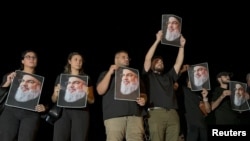Lebanese media is reporting that Hezbollah has named its deputy leader, Naim Qassim, to succeed Hassan Nasrallah, who was killed after Israeli planes bombed the organization's headquarters in Beirut's southern suburbs Friday.
It wan't clear if the interim appointment would be revised, amid reports that another Hezbollah leader, Hashim Safieddine, is seeking the position.
Hezbollah officially announced the death of its veteran leader Hassan Nasrallah on Saturday, after initially denying reports that he had been killed Friday in an Israeli attack on the group's bunker in Beirut's southern suburbs.
Iran's Revolutionary Guard also told Iranian media that Quds Force Deputy Commander Abbas Niloforoshan was killed alongside Nasrallah and several other top Hezbollah commanders, including the group's rocket expert, Ali Karaki, during the Israeli bomb attack Friday.
Iranian media reported that Supreme Leader Ali Khamenei was moved to a more secure location, amid fears that Israel might target him, as well. Israel assassinated Hamas leader Ismail Haniyeh in Tehran in August.
More than 200,000 Lebanese reportedly have fled their homes in parts of the country to escape possible Israeli attacks, and many are sleeping in parks and outdoor locations according to Lebanese media.
UNHCR head Filippo Grandi wrote in a post on social media platform X that 20,000 Lebanese also have fled to Syria. Lebanese media showed video of the Syrian border post along the highway from Beirut to Damascus overwhelmed by Lebanese and Syrians fleeing Lebanon.
Lebanese Health Minister Firaas Abiad told hospitals in Beirut and north of the capital "not to take unessential cases during the next week" in order to deal with the current wave of casualties from Israeli attacks.
Abiad also told Arab media that Lebanon has a four-month supply of medicine and other hospital necessities to deal with the current emergency but that it was requesting aid from other countries to deal with possible shortages.
The Lebanese army reportedly has deployed in many parts of the country that have been Hezbollah strongholds in recent years, but it wasn't clear if the government received a green light from the group to do so.






